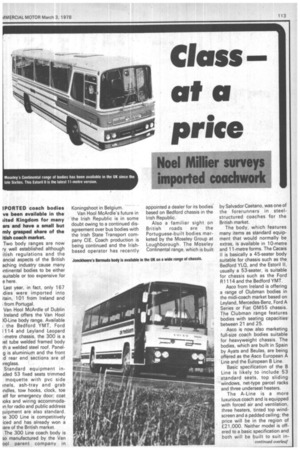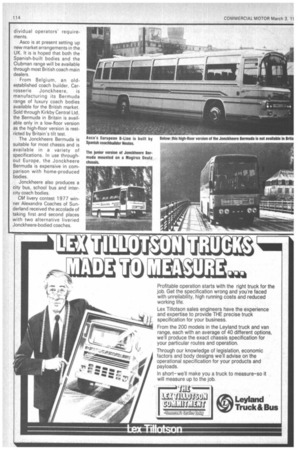Class at a price
Page 115

Page 116

If you've noticed an error in this article please click here to report it so we can fix it.
41oei Milner surveys imported coachwork
!PORTED coach bodies vs been available in the iited Kingdom for many ars and have a small but mly grasped share of the itish coach market.
Two body ranges are now ry well established although itish regulations and the ancial aspects of the British aching industry cause many rntinental bodies to be either 'suitable or too expensive for e here.
Last year, in fact, only 167 'dies were imported into itam, 101 from Ireland and from Portugal.
Van Hool McArdle of Dublin Ireland offers the Van Hool )0-Line body range. Available the Bedford YMT, Ford 1114 and Leyland Leopard -metre chassis, the 300 is a ;el tube welded framed body th a welded steel roof. Panelg is aluminium and the front d rear end sections are of ireglass.
Standard equipment inJded 53 fixed seats trimmed moquette with pvc side inets, ash-tray and grab Indies, tow hooks, clock, toe elf for emergency door; coat ioks and wiring accommodain for radio and public address iuipment are also standard. ie 300 Line is competitively iced and has already won a lare of the British market.
The 300 Line coach body is 30 manufactured by the Van Doi parent company in
Koningshoot in Belgium. —
Van Hool McArdle1s future in the Irish Republic is in some doubt owing to a continued disagreement over bus bodies with the Irish State Transport company CIE. Coach production is being continued and the Irishbased operator has recently
appointed a dealer for its bodies based on Bedford chassis in the Irish Republic.
Also a familiar sight on British roads are the Portuguese-built bodies marketed by the Moseley Group at Loughborough. The Moseley Continental range, which is built by Salvador Caetano, was one of the forerunners in steelstructured coaches for the British market.
The body, which features many items as standard equipment that would normally be extras, is available in 10-metre and 11-metre forms. The Cacais ll is basically a 45-seater body suitable for chassis such as the Bedford YLQ, and the Estoril II, usually a 53-seater, is suitable for chassis such as the Ford R1114 and the Bedford YMT.
Asco from Ireland is offering a range of Clubman bodies in the midi-coach market based on Leyland, Mercedes-Benz, Ford A Series or Fiat 0M55 chassis. The Clubman range features bodies with seating capacities' between 21 and 25.
Asco is now also marketing full-size coach bodies suitable for heavyweight chassis. The bodies, which are built in Spain by Ayats and Beulas, are being offered as the Asco European A Line and the European B Line.
Basic specification of the B Line is likely to include 53 standard seats, top sliding windows, net-type parcel racks and three underseat heaters.
The A-Line is a more luxurious coach and is equipped with forced air and ventilation, three heaters, tinted top windscreen and a padded ceiling; the price will be in the region of £21,000. Neither model is offered to a basic specification and both will be built to suit in dividual operators' requirements.
Asco is at present setting up new market arrangements in the UK. It is is hoped that both the Spanish-built bodies and the Clubman range will be available through most British coach main dealers.
From Belgium, an oldestablished coach builder, Car rosserie Jonckheere, is manufacturing its Bermuda range of huxury coach bodies available for the British market. Sold through Kirkby Central Ltd, the Bermuda in Britain is available only in a low-floor version as the high-floor version is restricted by Britain's tilt test.
The Jonckheere Bermuda is suitable for most chassis and is available in a variety of specifications. In use throughout Europe, the Jonckheere Bermuda is expensive in comparison with home-produced bodies.
Jonckheere also produces a city bus, school bus and intercity coach bodies.
CM livery contest 1977 winner Alexandra Coaches of Sunderland received the accolade of taking first and second places with two alternative liveried Jonckheere-bodied coaches.
































































































































































